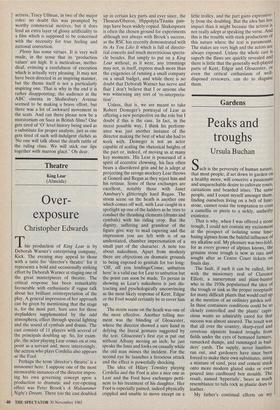Theatre
King Lear (Almeida)
Over-
Christopher Edwards
This production of King Lear is by Deborah Warner's enterprising company, Kick. The evening may appeal to those with a taste for 'director's theatre' for it represents a bold and occasionally striking effort by Deborah Warner at staging one of the great masterpieces of theatre. The critical response has been remarkably favourable with enthusiastic if vague talk about her brilliant reinterpretation of the play. A general impression of her approach can be given by mentioning that the stage is, for the most part, bare save for three stepladders supplemented by the odd atmospheric effect through special lighting and the sound of cymbals and drums. The cast consists of 11 players with several of the principals doubling up. So, for exam- ple, the actor playing Lear comes on at one point as a servant and, more interestingly, the actress who plays Cordelia also appears as the Fool.
Perhaps the term 'director's theatre' is a misnomer here. I suppose one of the most memorable instances of the director impos- ing his own governing concept upon a production to dramatic and eye-opening effect was Peter Brook's A Midsummer Night's Dream. There too the cast doubled up in certain key parts and ever since, the Theseus/Oberon, Hippolyta/Titania pair- ings have been widely copied. Shakespeare is often the chosen ground for experiments although not always with Brook's success, as the RSC has recently demonstrated with its As You Like It which is full of directo- rial conceits and much meretricious specta- cle besides. But simply to put on a King Lear without, as it were, any trimmings may not, in itself, express much more than the exigencies of running a small company on a small budget, and while there is no doubt that Deborah Warner has nerve and flair I don't believe that I or anyone else was witnessing any sort of 're-interpreta tion'.
Unless, that is, we are meant to take Robert Demeger's portrayal of Lear as offering a new perspective on the role but I doubt if this is the case. In fact, in the nicest possible way, I think his perform- ance was just another instance of the director making the best of what she had to work with. Demeger is not an actor capable of scaling the rhetorical heights of the part or, indeed, of moving us at many key moments. His Lear is possessed of a spirit of eccentric clowning, his face often bears a disordered grin and he is adept at projecting the savage mockery Lear throws at Goneril and Regan as they reject him and his retinue. Some of these exchanges are excellent, notably those with Janet Amsbury's glitteringly hard Regan. The storm scene on the heath is another one which comes off well, with Lear caught in a spotlight up one of the ladders as he tries to conduct the thrashing elements (drums and cymbals) with his riding crop. But the dignity, suffering and grandeur of the figure give way to mad capering and the impression you are left with is of an understated, chamber impersonation of a small part of the character. A note too about nakedness. Apart from modesty there are objections on dramatic grounds to being exposed to genitals for too long: 'Off, off you lendings/Come; unbutton here' is a valid cue for Lear to unbutton but the point can soon be made. To persist in showing us Lear's nakedness is just dis- tracting and pyschologically unconvincing as the most likely response of Kent, Edgar or the Fool would certainly be to cover him up.
The storm scene on the heath was one of the most effective. Another telling mo- ment was the blinding of Gloucester, where the director showed a sure hand in defying the literal gestures suggested by the text. Gloucester's first eye is put out without Albany moving an inch; he just speaks the lines and looks on casually while the old man mimes the incident. For the second eye he launches a ferocious attack and the effect is powerfully shocking.
The idea of Hilary Townley playing Cordelia and the Fool is also a nice one as Lear and the Fool have exchanges perti- nent to his treatment of his daughter. Her Fool is especially pained, indeed physically crippled and unable to move except on a little trolley, and the part gains expressive- ly from the doubling. But the idea has less impact than it might because the actress is not really adept at speaking the verse. And this is the trouble with stark productions of this nature where the text is paramount. The stakes are very high and the actors are always exposed. Unless the whole cast is superb the flaws are quickly revealed and there is little that the generally well-played parts of Kent, Edgar and Gloucester, or even the critical enthusiasm of well- disposed reviewers, can do to disguise them.


























































 Previous page
Previous page